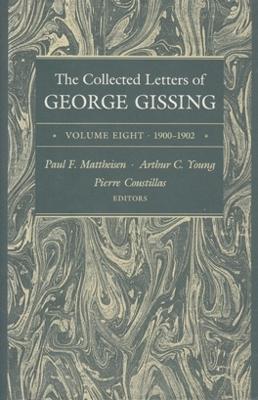The Collected Letters of George Gissing Volume 8
1 total work
For many years, the only Gissing letters available to the public were those in the modest selection of letters to his family published in 1927. In the following years a good number were published separately in such places as journals, memoirs, and sales catalogues, but like the single and small groups of unpublished letters scattered in libraries around the world, they remained in practical terms inaccessible. Even though in recent years small groups of letters have come into print, the rapidly growing numbers of Gissing readers and scholars now feel the need for access to his letters in an edition comparable to those of his contemporary novelist friends, Thomas Hardy and Joseph Conrad. In this edition, all the Gissing letters that could be found, published and unpublished, have been brought together from all known sources: private and public collections, journals, newspapers, memoirs, biographies, and sales catalogues. The important advantage is not only that they have at last been brought together, but also that they are placed chronologically and given a uniform editorial context which provides a coherence lacking in letters separately published.
A significant feature of this edition is that it also contains, whenever they are available, letters to Gissing which are of great help in recording his life during the times when his own letters have been lost or destroyed. One might expect the years covered by this volume, 1900-1902, would have been among Gissing's happiest. During the greater share of this time he was with his beloved Gabrielle Fleury, sometimes living in great comfort in France, and he enjoyed some periods of good health. But gloom and depression seemed to be his companions wherever he went. And Gabrielle had to tend daily to her sickly mother, who was a formidable presence in Gissing's life. Gissing makes it clear that he is aware that happiness will elude him. Typical comments in his letters include: "The whole of this present life is spent in gaining experience which it is always too late to use." And further, during the Boer War, "I wish I had died ten years ago. I should have gone away with some hope for civilization, of which I now have none." He was to write later that one "puts into literary form hopes which are not very likely to be realized."
And yet he was able to work and was able to see Our Friend the Charlatan along with By the Ionian Sea published during these years.
A significant feature of this edition is that it also contains, whenever they are available, letters to Gissing which are of great help in recording his life during the times when his own letters have been lost or destroyed. One might expect the years covered by this volume, 1900-1902, would have been among Gissing's happiest. During the greater share of this time he was with his beloved Gabrielle Fleury, sometimes living in great comfort in France, and he enjoyed some periods of good health. But gloom and depression seemed to be his companions wherever he went. And Gabrielle had to tend daily to her sickly mother, who was a formidable presence in Gissing's life. Gissing makes it clear that he is aware that happiness will elude him. Typical comments in his letters include: "The whole of this present life is spent in gaining experience which it is always too late to use." And further, during the Boer War, "I wish I had died ten years ago. I should have gone away with some hope for civilization, of which I now have none." He was to write later that one "puts into literary form hopes which are not very likely to be realized."
And yet he was able to work and was able to see Our Friend the Charlatan along with By the Ionian Sea published during these years.
